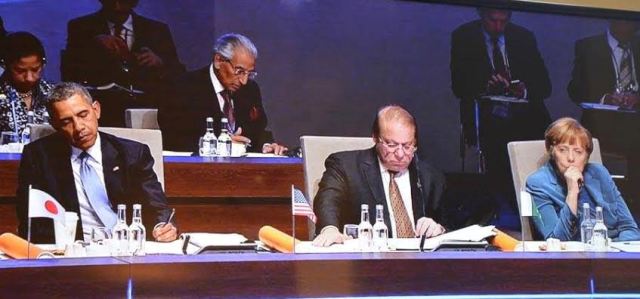THE HAGUE, (APP): Prime Minister Muhammad Nawaz Sharif said that Pakistan attached highest importance to nuclear security because it was directly linked to country’s national security. “Pakistan is a responsible nuclear weapons state and pursue a policy of nuclear restraint, as well as credible minimum deterrence,” the Prime Minister said while speaking at the 3rd Nuclear Security Summit here.
Leaders from 53 countries, United Nations, European Union, International Atomic Energy Agency and Interpol are attending the nuclear summit. “Our region needs peace and stability for economic development that benefits its people. That is why, I strongly advocate nuclear restraint, balance in conventional forces and ways to resolve conflicts,” the Prime Minister said.
He said Pakistan’s nuclear security was supported by five pillars – a strong command and control system led by the National Command Authority (NCA); an integrated intelligence system; a rigorous regulatory regime; a comprehensive export control regime; and active international cooperation.
The Prime Minister said Pakistan’s security regime covered physical protection, material control and accounting, border controls and radiological emergencies.
He said that Pakistan’s nuclear materials, facilities and assets were safe and secure and the country’s nuclear security regime was anchored in the principle of multi-layered defense for the entire spectrum – insider, outsider or cyber threat.
The Prime Minister said Pakistan has established a Centre of Excellence that conducts intense specialized courses in nuclear security, physical protection and personnel reliability, adding that Pakistan was ready to share its best practices and training facilities with other interested states in the region and beyond.
The Prime Minister on the occasion paid tribute to President Barack Obama for launching the nuclear security summit process four years ago.
Prime Minister Sharif said Pakistan had been running a safe, secure and safeguarded civil nuclear programme for more than forty years and the country had the expertise, manpower and infrastructure to produce civil nuclear energy.
“As Prime Minister, I feel that energy deficit is one of the most serious crises facing Pakistan. As we revive our economy, we look forward to international cooperation and assistance for nuclear energy under IAEA safeguards,” he added.
The Prime Minister called for Pakistan’s inclusion in all international export control regimes, especially the Nuclear Suppliers Group.
He said international treaties and forums should supplement national actions to fortify nuclear security.
He said Pakistan was a party to the Convention on the Physical Protection of Nuclear Material (CPPNM) and worked closely with the IAEA to deal with safety and security of radioactive sources and illicit trafficking of nuclear materials.
The Prime Minister said Pakistan regularly submitted reports to the UN Security Council 1540 Committee on the measure the country take to exercise control over transfer of sensitive materials and technologies.
“Looking back, we can say with confidence that our decisions and commitments have spurred national action, promoted international cooperation and fostered nuclear security culture,” the Prime Minister said adding that Pakistan has constructively contributed to this process.
The Prime Minister said all leaders gathered here wanted nuclear security, which was a national responsibility and a global priority.
He said all the countries should continue to take measures to secure all nuclear facilities and materials and prevent any perceived nuclear terrorist threat.
“We all need radioactive sources for hospitals, industry and research; but should be vigilant about radiological threats,” he added.
He said Pakistan has also deployed radiation detection mechanisms at several exit and entry points to prevent illicit trafficking of radioactive and nuclear materials.
In the realm of international cooperation on nuclear security, the Prime Minister said the IAEA has an essential responsibility and a central role to play, adding that Pakistan has been working productively with the IAEA to implement its Nuclear Security Action Plan (NSAP).
The Prime Minister on the occasion announced that Pakistan was considering ratification of the 2005 Amendment to the CPPNM and was actively conducting a review to meet its various requirements.
“As we look towards the future, we should consolidate progress made so far on nuclear security. We must also maintain our political will, avoid duplication of effort and broaden our membership to gain more acceptance for our decisions,” the Prime Minister said.


Leave a comment